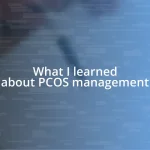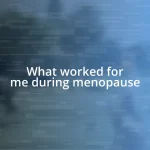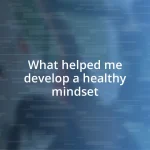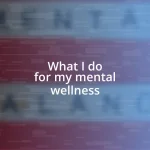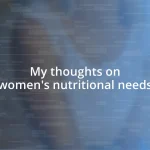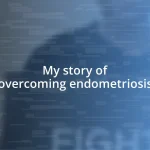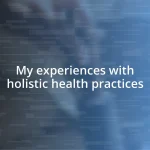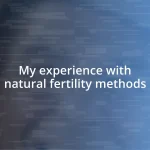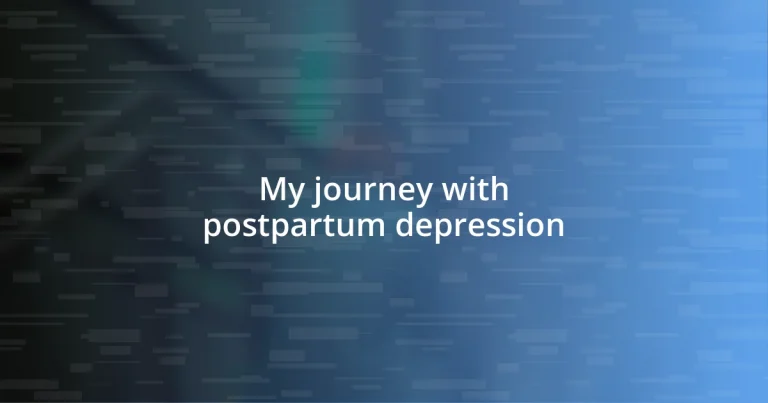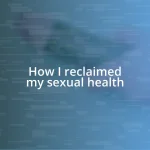Key takeaways:
- Recognizing early symptoms of postpartum depression, such as unexpected tears and overwhelming fatigue, is crucial for timely intervention and support.
- Seeking professional help and building a support system with friends, family, and other mothers significantly aids in the healing process.
- Engaging in self-care practices, mindfulness, and creative outlets fosters resilience and helps navigate the emotional challenges of postpartum depression.
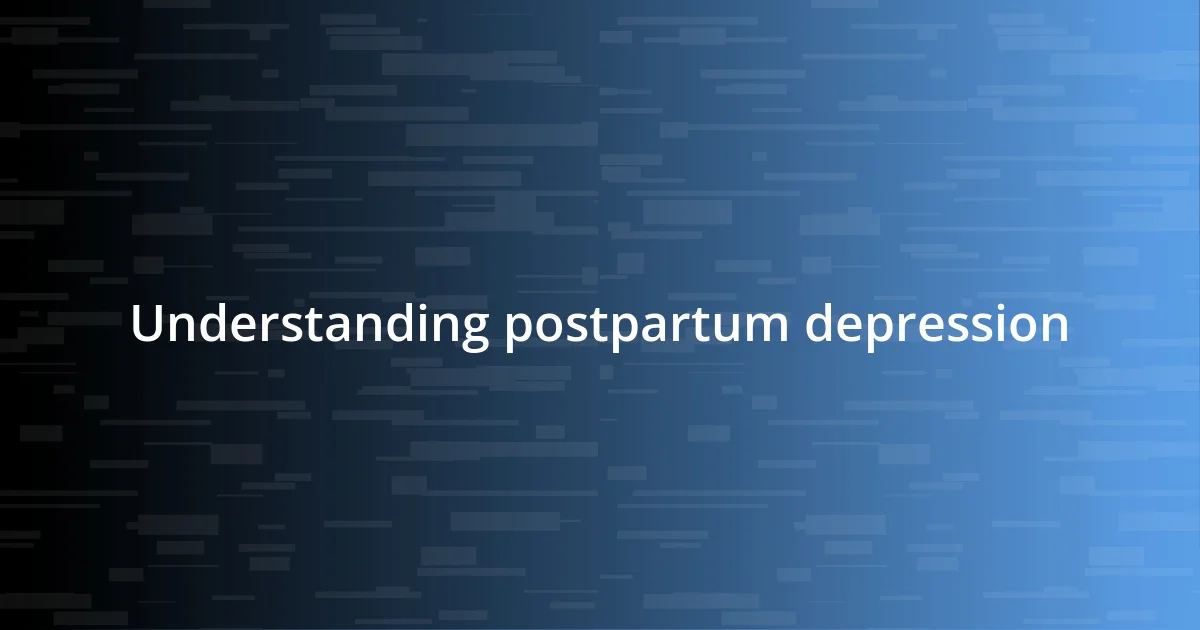
Understanding postpartum depression
Postpartum depression (PPD) is a complex emotional condition that affects many new mothers, often overshadowed by the joy of welcoming a new life. I remember feeling an overwhelming sense of joy on the outside, yet inside, I was battling feelings of sadness and inadequacy. How could I feel so low when I had this beautiful baby in my arms? This discrepancy often leaves mothers feeling isolated, as if no one else understands the struggle beneath the surface.
One striking aspect of PPD is that it can affect anyone, regardless of previous mental health history. A close friend of mine, an upbeat and confident individual, experienced a deep, unshakable gloom after her baby was born. She often questioned, “Why am I feeling this way?” It’s a sentiment that resonates with many – the guilt of not living up to perceived expectations can deepen the struggle.
The emotional rollercoaster that accompanies PPD is incredibly taxing. It’s not just about feeling sad; it can include anxiety, irritability, and even panic attacks. I’d sometimes find myself in tears over the simplest things, like a pile of laundry or a crying baby. It makes you wonder, doesn’t it? Why aren’t we encouraged to talk more openly about these feelings? Understanding that PPD is not a personal failure but a medical condition is crucial in breaking the stigma and offering support to those who need it.
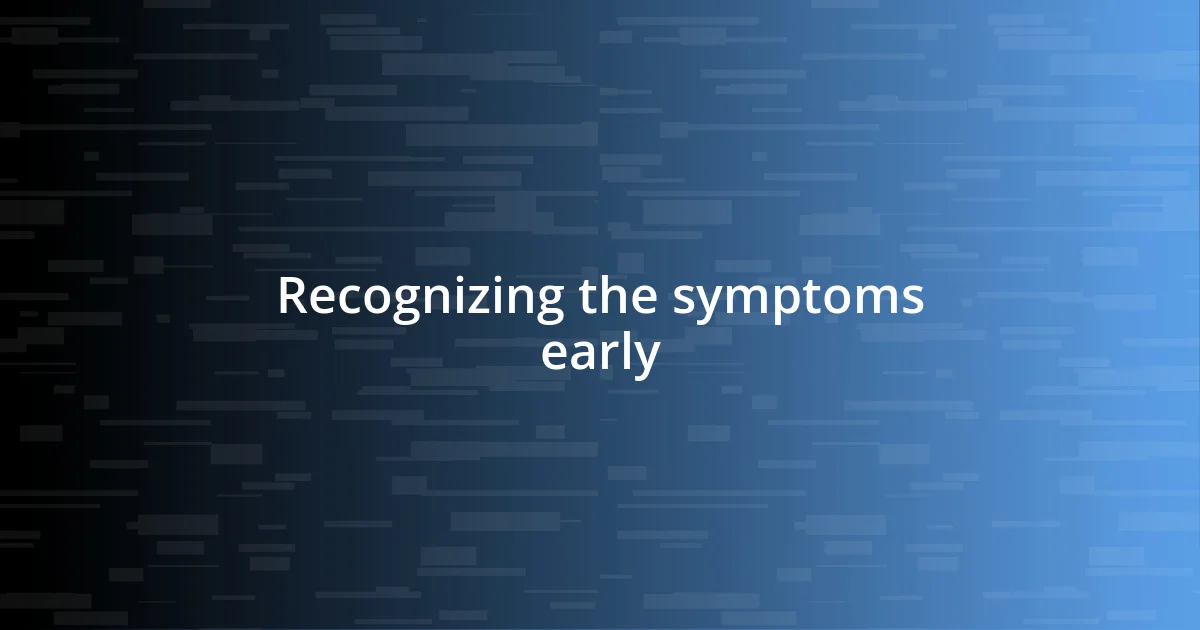
Recognizing the symptoms early
Recognizing the symptoms of postpartum depression early can make a significant difference in getting the help needed. When I first became a mother, I noticed I was crying for no reason at all. Those tears weren’t just a momentary glitch; they hinted at deeper feelings of sadness and disconnection that I couldn’t fully articulate at the time. It’s essential to recognize these early signs to prevent further emotional decline.
Another key symptom is the overwhelming fatigue that goes beyond just being tired from caring for a newborn. I vividly remember one day being so exhausted that even the thought of taking a shower felt impossible. This type of fatigue is different; it’s like carrying an invisible weight that drains both my physical and emotional energy. It’s important to understand that feeling persistently weary, even after rest, could indicate something more serious.
I would also urge new mothers to pay attention to feelings of guilt or inadequacy. I found myself constantly comparing my parenting to others, feeling like I was falling short. If you notice this pattern, it’s crucial to reach out for support before those feelings escalate. Recognizing these symptoms early can lead to a more positive journey through motherhood, paving the way for healing and connection.
| Common Symptoms | Description |
|---|---|
| Crying Jags | Unexpected tears that indicate underlying sadness. |
| Exhaustion | A profound tiredness that isn’t alleviated by sleep. |
| Feelings of Guilt | Intense guilt about parenting abilities or decisions. |
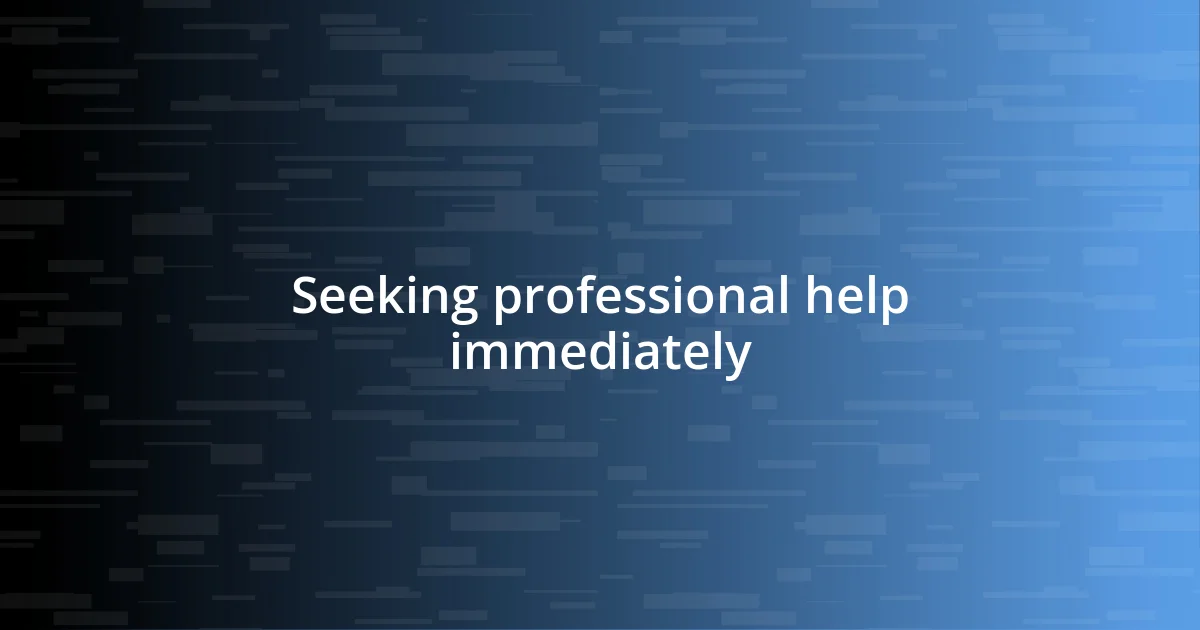
Seeking professional help immediately
Seeking help for postpartum depression should never be put on the back burner. I know from experience that waiting too long can lead to deeper despair. When I finally reached out to a professional, it felt like a weight was lifted. It’s crucial to understand that asking for help is not a sign of weakness, but rather a courageous step towards healing and recovery from the emotional turmoil.
- A mental health professional can offer the right tools and strategies to manage your feelings.
- Therapy provides a safe space to express your emotions openly without judgment.
- Medication can be beneficial for some women, helping balance the brain chemicals affected by PPD.
For me, the first conversation with my therapist was a turning point. I was surprised by how validating it felt to voice my struggles, realizing I wasn’t alone in this daunting journey. Seeking professional help right away can help you regain control and start to see the light at the end of the tunnel. It’s important to prioritize your mental health and give yourself the grace to seek support when you need it.
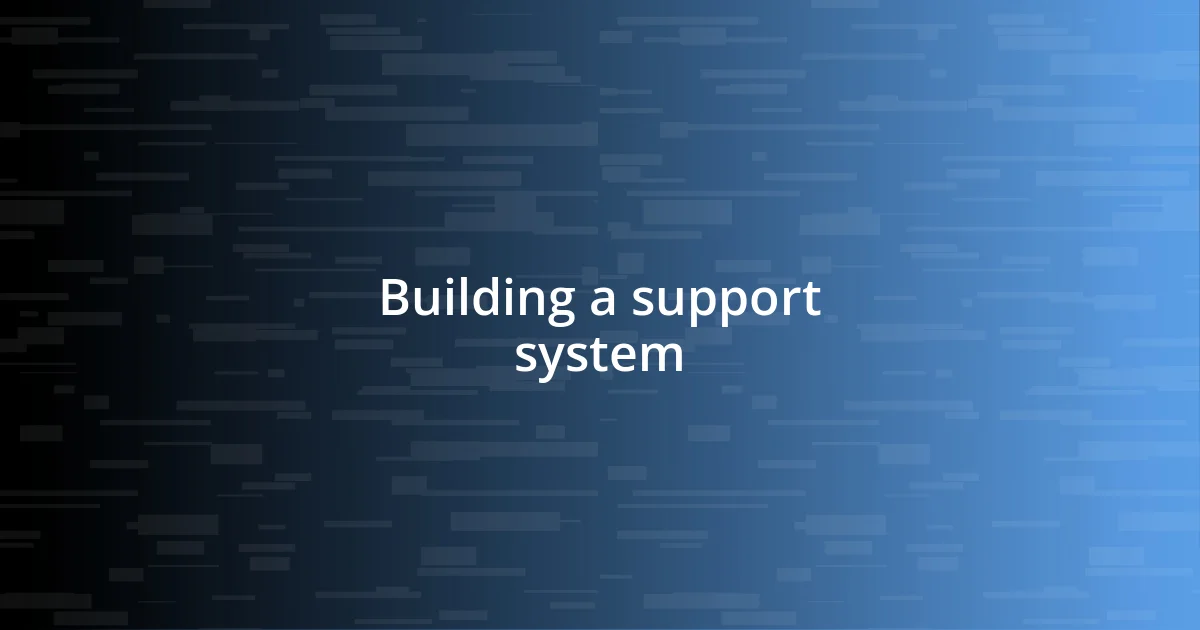
Building a support system
Building a support system is crucial when navigating the turbulent waters of postpartum depression. I remember feeling utterly alone during my toughest moments, yet, when I began to open up to close friends and family, their understanding made a world of difference. It’s challenging to ask for help, but have you considered how many people genuinely want to support you? Just by sharing your feelings, you might discover that others have faced similar struggles, creating a connection that can lighten the emotional load.
I found that surrounding myself with other mothers who understood the unique challenges of postpartum life was incredibly helpful. We formed a monthly coffee group, where we’d share our highs and lows without judgment. This camaraderie offered a safe harbor, fostering an environment where it was okay to express vulnerability. I often left those meetings feeling understood and appreciated, which is something I desperately needed at the time.
Moreover, reaching out to professionals can complement your personal network. I was hesitant at first, thinking I could handle it all on my own, but when I sought out a postpartum support group, it was like finding a lighthouse during a storm. Have you ever felt a shared sense of relief in a group? I certainly did, realizing that I wasn’t alone in my feelings and that together we could navigate this journey toward healing. Building a support system takes time and courage, but the connections formed are invaluable and essential for recovery.
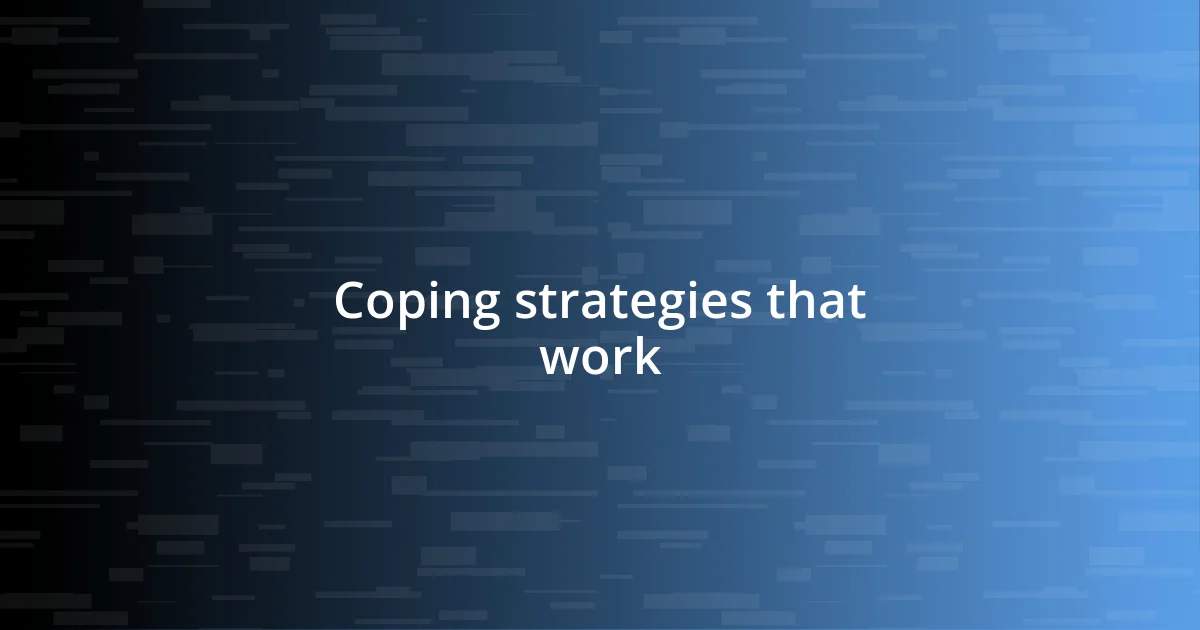
Coping strategies that work

Utilizing self-care strategies
Self-care became a lifeline for me during my battle with postpartum depression. I discovered that even small rituals, like taking a quiet moment for myself with a cup of tea, could make a significant difference. Have you ever noticed how taking just five minutes to breathe deeply can shift your mood? It’s a simple yet profoundly effective strategy. I began incorporating short walks into my day, which not only got me moving but also cleared my mind. Nature has a way of soothing the soul, doesn’t it?
Moreover, I found journaling to be an effective outlet. Pouring my thoughts onto the page allowed me to process my feelings without fear of judgment. I’ll never forget the relief I felt the first time I read back what I wrote; it helped me recognize patterns in my emotions and understand triggers. Is there a better way to build self-awareness than to confront your thoughts directly? In those moments of reflection, I discovered that I was stronger than I realized and more capable of managing my feelings than I initially believed.
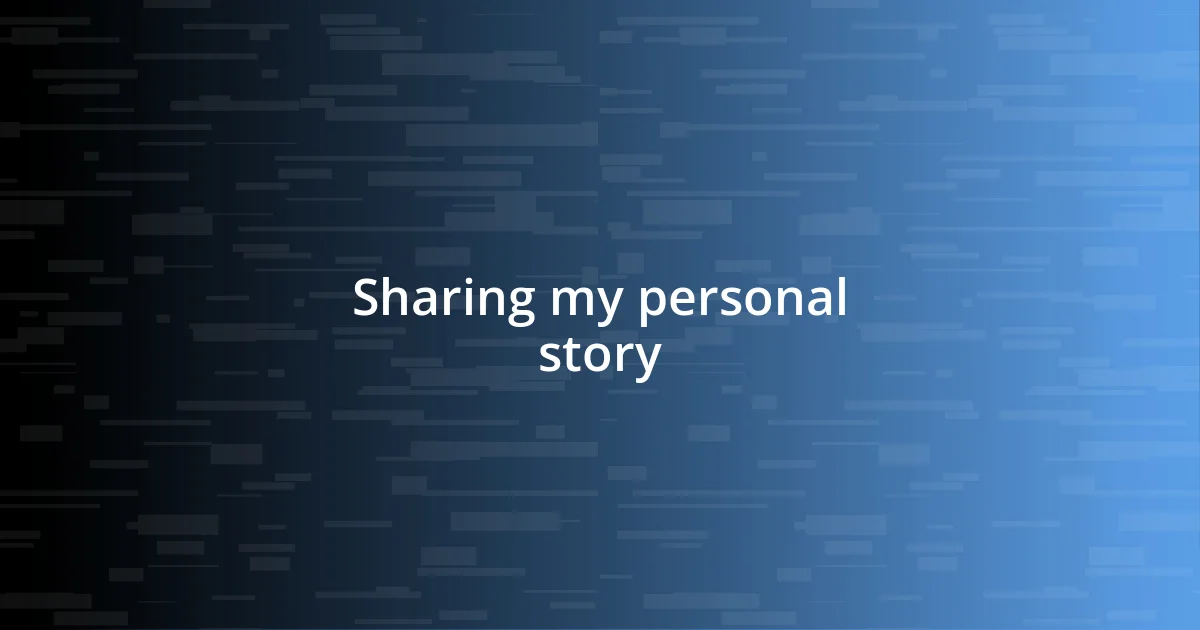
Practicing mindfulness and relaxation techniques
Mindfulness turned out to be a powerful tool in my coping arsenal. At first, the idea of concentrating on the present moment felt daunting. I wondered, how could my chaotic thoughts ever settle? But as I explored mindfulness meditation, something shifted. It was liberating to acknowledge my feelings without judgment, allowing me to simply observe them instead of being consumed by them.
To add to this, I began experimenting with simple relaxation techniques, like deep breathing exercises. I vividly remember sitting in my nursery one evening, feeling overwhelmed and anxious. With each slow breath, I could literally feel the tension slipping away. Have you noticed how focusing on your breath can anchor you? It’s amazing how such a small practice can gradually help reduce anxiety. By integrating mindfulness into my daily routine, I reclaimed a sense of calm and presence in a time when life felt overwhelmingly hectic.
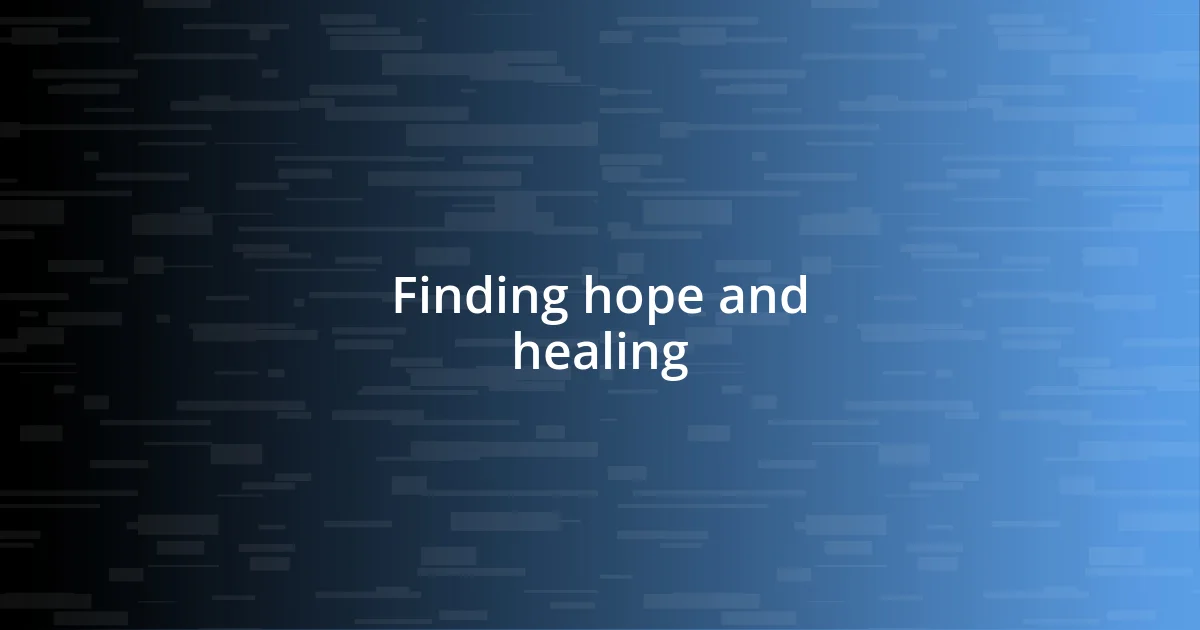
Engaging in creative outlets
Embracing creativity acted as a much-needed release during my postpartum journey. I remember dusting off my paints and allowing colors to flow freely on canvas without worrying about the outcome. It was all about expression rather than perfection. Have you ever lost track of time while engaged in a creative activity? That feeling is pure magic! Whether it was doodling, crafting, or even cooking new recipes, these moments provided a welcome escape from my emotional struggles.
I also discovered that sharing my art with others fostered meaningful connections. I hosted a small gathering where friends could explore their creative sides, and the camaraderie was uplifting. I felt a sense of belonging as we laughed and created together. It’s astonishing how engaging in creative outlets not only lifted my spirits but also encouraged a support network of like-minded individuals. Reflecting on this, I believe there’s incredible healing power in creativity, don’t you?

Sharing my personal story
Sharing my personal story around postpartum depression feels incredibly important to me. I’ll never forget the day I first admitted my struggles to a close friend. It was as if an enormous weight lifted off my shoulders, and I felt a flicker of hope ignite within me. Have you ever experienced that rush of relief when you finally share a burden? I realized that voicing my feelings not only lightened my load but also opened the door for invaluable support from those around me.
One of my most profound moments in this journey occurred at a family gathering. I hesitated to engage, feeling overwhelmed, but when I shared my feelings with my sister, her response was nothing short of healing. “You’re not alone,” she said, her eyes filled with understanding. That validation turned my anxiety into a shared experience. It reinforced the notion that isolation often amplifies our struggles, don’t you think? Knowing someone else understands can truly create a bridge over turbulent waters.
As I navigated the highs and lows, I started journaling my experiences. Initially, it felt like a daunting task, but I soon found that pouring my thoughts onto the page was both cathartic and enlightening. I distinctly remember one entry where I penned down my darkest thoughts, only to realize that writing them made them seem less powerful. It was a reminder that by confronting our emotions head-on, we begin to dissolve their grip on us. Isn’t it fascinating how our words can bring clarity and solace in moments of chaos?

Finding hope and healing
Finding hope during my journey with postpartum depression often felt like searching for a needle in a haystack. However, I stumbled upon a simple affirmation that changed my perspective: “I am enough.” Every morning, as I stood in front of the mirror, repeating these words out loud, I felt a shift within me. Have you ever noticed how powerful a little self-affirmation can be? It began to cultivate a sense of self-love that I desperately needed, reminding me that healing was a journey, not an overnight transformation.
Gradually, I discovered the beauty in community support. I joined a local postpartum support group where women openly shared their stories. Listening to their experiences made me feel less isolated in my struggles. It was incredibly validating to see others grappling with similar feelings. Have you ever felt the warmth of knowing others are walking the same path? That connection fostered a newfound sense of hope, letting me know I wasn’t fighting this battle alone. I realized that the collective wisdom we shared provided not only comfort but also practical strategies for navigating the tough days.
On particularly rough days, I sought solace in small victories. I remember the first time I managed to get out of the house and enjoy coffee with a friend. It felt like climbing a mountain! I savored each sip, relishing the laughter and conversation, and for a fleeting moment, the weight of my depression faded. Doesn’t it amaze you how sometimes, the smallest moments can bring the biggest rays of light into our lives? These tiny yet significant milestones acted as stepping stones toward embracing hope and healing, leading me to appreciate the beauty in small joys.
